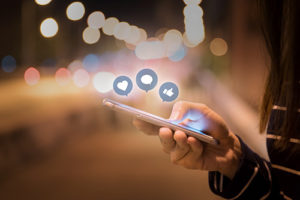
Research estimates suggest that worldwide, there are around 2.34 billion social media users – and that number is expected to increase to 2.95 billion in the year 2020. Facebook, Instagram, Twitter, Pinterest, you name it – there are more apps than a person can count, and they all have a place in various aspects of living. Social media used to be simply for connecting with long-lost friends, but it’s become a staple component of daily life – to give updates, to network, to propel movements and to help people. The addiction recovery realm has seen a surge of social media applications specifically for this – to connect with other people in recovery, to seek advice for issues pertaining to sobriety or addiction, to find meet-up groups and others. At this day in age, the question still remains: Is social media helping or harming? And, more, specifically, is it helping or harming those who are pursuing sobriety?
Social Media and Mental Well-being
According to a 2018 publication titled, “Digital Health Practices, Social Media Use, and Mental Well-being Among Teens and Young Adults in the U.S.”, social media is having some pretty negative effects when it comes to mental health:
- It’s leading teens and youth to feel “less than” compared to their peers
- It’s hurting those who are victimized or receive a continuous stream of negative comments
- It’s contributing to the rise of depression and anxiety
- And more
Of course, the experience individuals have with social media could be due to a number of things – how often they’re on social media, which platforms they use, how they utilize these platforms and more. For others, social media serves a number of potential benefits when it comes to mental well-being:
- Individuals can use social media to connect with others who are struggling with certain health problems
- Social media can provide information to those looking for health-related news and self-help tools
- Creative expression through social media platforms can be therapeutic for some users
- And more
How does all of this fit into addiction recovery? Mental well-being is critical for individuals pursuing sobriety, and while outpatient treatment is incredibly successful in providing support, tools and resources to helping a person maintain and achieve their recovery goals, a person does return home to their “normal” life at the end of the day – and the way they use social media could either help or hinder their progress in recovery.
It’s All About the Way You Apply It
A study conducted by researchers from California found that those in addiction recovery tend to be more honest about their experiences through social media support services rather than face-to-face. Positive reactions on social media were found to build up online support as well, which can certainly have positive implications for someone in recovery. A 2017 study published in the journal Drug and Alcohol Dependence found that advice and support and the two most common motivating factors for those in addiction recovery using social media – and if you find that it does provide an added level of security to your sobriety journey while you work in your outpatient treatment program, you should certainly maximize on the benefits of this.
In 2017, Beau Mann explained his story to Business News Daily of using social media to his advantage in addiction recovery. He explained,
“I was 24 years old, and I was ready to break free from my addiction. I entered a 12-Step program, became part of a supportive community, and began my journey towards recovery.”
He explained that while in recovery, he experienced loneliness – and this loneliness led him to create a recovery support network online that brought people together. In 2015, he launched Sober Grid, where his business has now helped over 80,000 people connect with others in a community dedicated to sobriety. For him, social media was only a stepping stone towards creating a platform that would change the recovery world for the better. He stated,
“As I know from experience, becoming and remaining sober is anything but easy. Without support networks in place, it almost feels impossible. That’s why I’m so incredibly proud to have built a platform that connects individuals with a community dedicated to recovering from addiction.”
Apps to Support Your Sobriety Journey
In addition to Sober Grid, there are many other apps that you can utilize to help boost your motivation in sobriety:
- Twenty-Four Hours a Day – a meditative app with daily prayers and teachings
- 12 Steps AA Companion – you get the Big Book of AA right at your fingertips, along with prayers, promises and a sobriety calculator
- I Am Sober – it notifies you of new milestones you’ve reached in recovery
- Happify – this app includes over 30 audio recordings that will guide you towards positive thoughts
If you’re ready to become more independent in your recovery while also maintaining a strong supportive foundation in therapy, group activities and more, speak with a professional from Cumberland Heights at Crossville Treatment.
Cumberland Heights in Crossville Tennessee is a 12-Step based outpatient alcohol and drug rehab program. Cumberland Heights’ Intensive Outpatient Program is designed for individuals age 18 and above who may be in the early stages of dependency or are experiencing problems with alcohol or drug use. If you’re ready to seek help today, call us at 931-250-5200.










